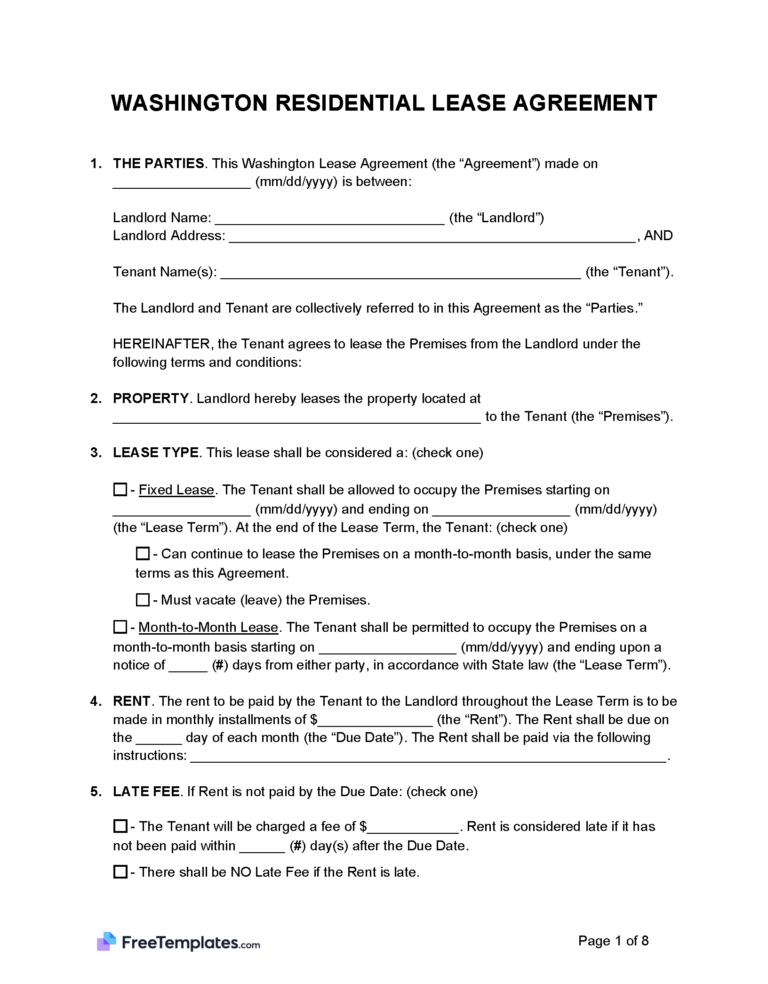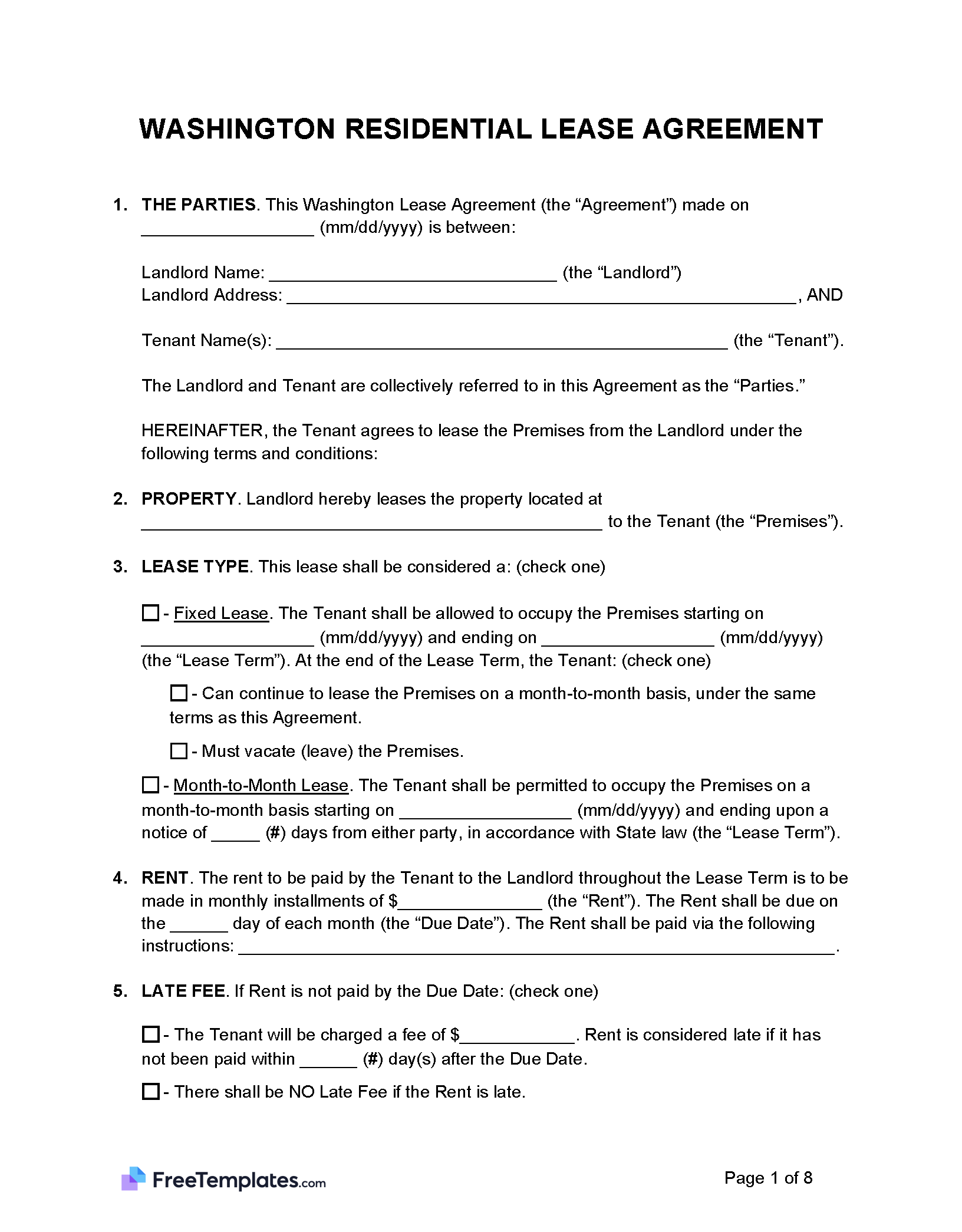By Type (6)
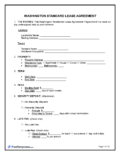 Standard Lease Agreement – A fillable arrangement where a landlord and a renter legally complete the rental of a property. Standard Lease Agreement – A fillable arrangement where a landlord and a renter legally complete the rental of a property. |
Commercial Lease Agreement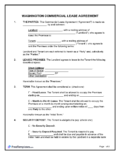 – When a business rents a property, this arrangement contains information about the building and length of the lease by the property manager. – When a business rents a property, this arrangement contains information about the building and length of the lease by the property manager.
|
Month-to-Month Lease Agreement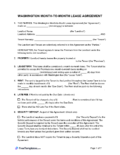 – A continuous rental arrangement by which the agreement renews at the end of each month. – A continuous rental arrangement by which the agreement renews at the end of each month.
|
Rent-to-Own Agreement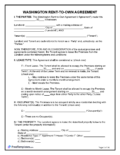 – This is applicable when a tenant chooses to purchase the property at the end of the lease. – This is applicable when a tenant chooses to purchase the property at the end of the lease.
|
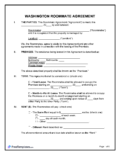 Roommate Agreement – This is used when two renters establish an agreement setting forth conditions of a shared unit. Roommate Agreement – This is used when two renters establish an agreement setting forth conditions of a shared unit.
|
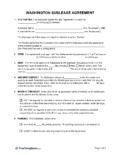 Sublease Agreement – Requires permission of the landlord to sublet the space from the current tenant to another individual. Sublease Agreement – Requires permission of the landlord to sublet the space from the current tenant to another individual.
|
Disclosures (6)
Fire Safety – Properties that encompass more than a single-family home require the landlord to disclose any fire protection and safety measures before signing a rental agreement. (§ 59.18.060(12))
Landlord’s Contact Details – The landlord’s name and address must be available to the tenant before signing the lease agreement unless the information is visible in plain sight at the property’s location. (§ 59.18.060)
Lead-Based Paint Disclosure – This form is used to raise awareness of potential lead hazards related to any home built prior to 1978. The form must be completed prior to entering the rental agreement. (EPA/HUD Fact Sheet)
Mold Information – Any mold found on the property must be disclosed to the renter in the rental agreement. A mold information pamphlet provided by the Department of Health must be provided to the renter in written format before the lease starts. (§ 59.18.060)
Move-In Checklist – At the lease signing, the renter must complete a checklist provided by the landlord documenting any issues, damages, or defects found on the property. At lease end, the list will be compared to the current state of the property. (§ 19.18.260)
Non-refundable Fees – The lease agreement must clearly disclose any non-refundable fees paid to the landlord. (RCW 59.18.285)
Security Deposit
Maximum Amount – In Washington, there is no maximum security deposit amount that a landlord can charge a tenant. The only exception is that in the city of Seattle, the landlord may charge a maximum security deposit of one month’s rent. (§ 7.24.035(A)
Returning to Tenant – As of 2024, the landlord must return the security deposit to the tenant within 21 days of the lease’s end. (§ 59.18.280(1)(a))
Landlord Access
General Access – The tenant must be given a minimum of two days’ notice before the landlord enters the property to carry out maintenance or repairs on the building. A one-day notice may be given to the tenant if the property is being shown to another potential tenant or buyer. (RCW 59.18.150(6))
Emergency Access – In the case of an emergency, the landlord has the right to enter the premises without the tenant’s consent. (RCW 59.18.150(5))
Paying Rent
Grace Period – Washington requires the rent to be paid within 5 days of the due date. If the renter does not pay within five days, then the landlord may serve a 14-day notice to quit. (RCW 59.18.170(2))
Maximum Late Fee – Any late fee charge must be clearly outlined in the written lease agreement. The state of Washington requires that the penalty for a late payment must be between $20 and 20% of the monthly rent. (§ 19.150.150)
Returned Checks (NSF) – The landlord will issue a $40 penalty fee for any bounced check written by the tenant. (RCW 62A.3-515(a))
Reasons for Eviction (3)
Illegal Activity – If the landlord finds the tenant violating the lease agreement by conducting illegal activity on the property, they may evict the renter without notice. Some of the breaches of the lease agreement include physical or sexual assault, displaying a firearm, harassment, or stalking. (RCW 59.18.575)
Non-Compliance – Any tenant who violates the property by damaging it, smoking, housing extra people, or housing a pet in a non-pet-approved unit may be served a 10-day notice to quit. (§ 59.12.030(4))
Non-Payment of Rent – If the tenant does not pay their rent on time, they may be served a 14-day notice to quit by the landlord. (§ 59.12.030(3))
